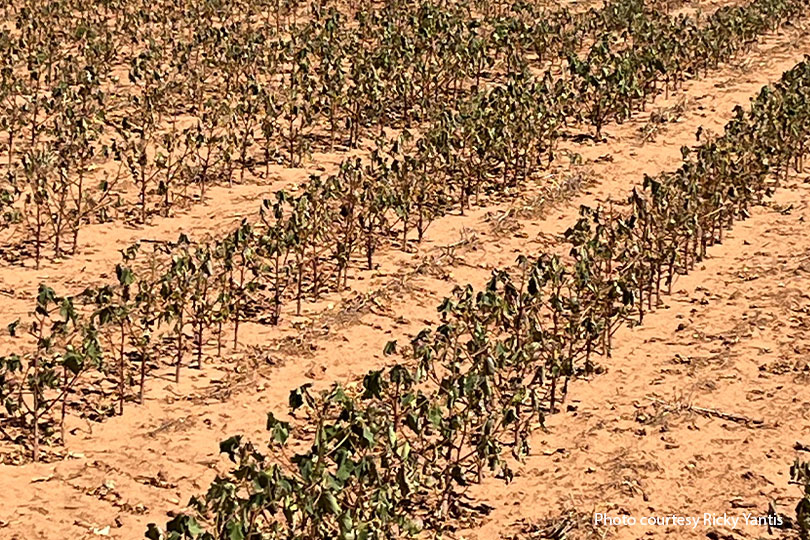By Shelby Shank
Field Editor
Anticipation and hope filled cotton farmers for this year’s crop, but limited rainfall and triple-digit temperatures devastated the cotton crop across the state.
“It got off to a great start and was growing good. Most producers like me were very optimistic,” Lamb County farmer Ricky Yantis said in an interview with the Texas Farm Bureau Radio Network. “We were pretty aggressive on fertilizing and treating our cotton and trying to do the best we could and thinking it was going to rain.”
But the rain never fell during the summer.
Yantis said the last big rain event in the summer for the area was June 2.
It’s a stark contrast from how the year started. Spring rains replenished the soil and even prevented some farmers, like Yantis, from planting on time.
Conditions were looking great until they weren’t.
“It has been a challenging year. We started off too wet, and that caused some prevented planting because we couldn’t get in the fields,” he said. “Now, we haven’t had any measurable precipitation since June.”
The West Texas cotton crop, like that across the state, has suffered in the drought and heat, taking a toll on many farmers.
“The ground is toast,” Yantis said. “I’ve never seen cotton die and turn brown.”
He said 2011 was an extremely hot year and tough on the cotton crop, but it didn’t turn brown.
“This year, it seems like the heat has just been more intense, and we’ve had hot winds, as well. The dryland cotton is blistered and burned. A lot of the crop is turning brown and dying. I’ve never seen it get to this point,” he said.
Yantis said his irrigated crops are doing well, but he expects a major yield reduction because the crop has not matured enough.
“It’s been very, very challenging and very tough. We pump our water from the Ogalala Aquifer, and our wells have struggled,” Yantis said.
In 2011, Yantis said the drought changed their water levels and irrigation. He believes 2023 might be even worse because of short water supply and feasibility to irrigate in the area.
“We don’t have that capability anymore. We’re at deficit watering, and we just cannot offset these hot temperatures that we’re having right now,” Yantis said.
As of Sept. 9, there have been 46 days this year where the temperature has reached triple-digits in Lubbock.
But through it all, Yantis remains hopeful.
“Farming is a good life and there’s always next year, and that’s the hope that most of us have—that next year will be better,” he said. “That’s the way we are. You’ll never find anybody more faithful than farmers because we plant that seed on hope that it’ll come up and produce and make us something by the end of the year.”


Leave A Comment